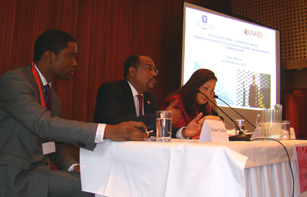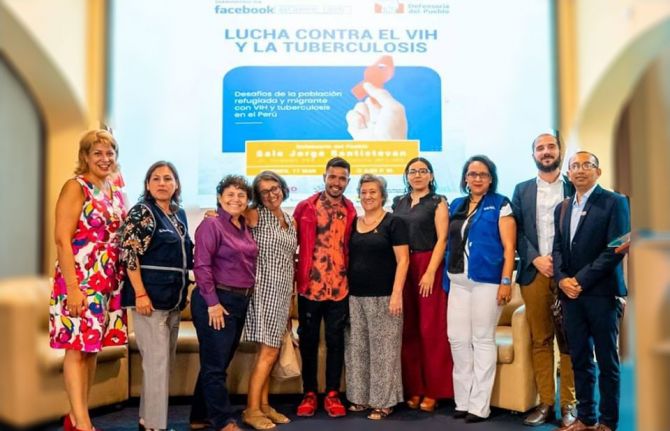
Feature Story
Nordic countries continue to back the AIDS response
15 February 2012
15 February 2012 15 February 2012
UNAIDS Executive Director Michel Sidibé (centre) speaking at the consultation on the criminalisation of non-disclosure, exposure or transmission of HIV. Oslo, Norway, 14 February 2012.
Credit: UNAIDS
The Nordic countries have reiterated their commitment to HIV and to doing their part to help countries reach the ambitious targets set out by United Nations Member States in the 2011 Political Declaration on AIDS.
Their strong support was heard by the Executive Director of UNAIDS Michel Sidibé during a working meeting with range of health and development partners from the Nordic countries to discuss greater collaboration in moving the AIDS agenda forward.
The meeting was part of a two-day visit to Sweden and Norway by the Executive Director of UNAIDS which began in the Swedish capital of Stockholm. During the discussions, health and development representatives from Denmark, Finland, Norway and Sweden talked about the importance of human rights, HIV services for young people, and shared responsibility responding to HIV.
“The Nordic countries have been global leaders in areas of human rights and women’s sexual and reproductive health and rights and they continue to be strong partners in the shared responsibility agenda,” said Mr Sidibé. “Their support, particularly as low- and middle- income countries look at ways of reversing the AIDS dependency crisis, remains vital to the success of the global AIDS response.”
Mr Sidibé discussed in detail Sweden’s policy priorities––which include addressing the needs of people most at risk of infection and ensuring human rights and gender equality––during a meeting with Sweden’s Minister for Development Cooperation Ms Gunilla Carlsson.
The Nordic countries have been global leaders in areas of human rights and women’s sexual and reproductive health and rights and they continue to be strong partners in the shared responsibility agenda
UNAIDS Executive Director Michel Sidibé
The Minister underscored the importance of seeking new paradigms for development cooperation that build on accountability and shared responsibility. She also welcomed UNAIDS’ efforts to address the AIDS dependency crisis and highlighted the UNAIDS investment framework as an important tool in a new phase of development cooperation.
Civil society groups and parliamentarians in Sweden met with the Executive Director of UNAIDS and spoke about the importance of UNAIDS’ work in protecting the rights of people most at risk of HIV and ensuring equity in access to HIV services.
A major focus of the Norway leg of the visit was a consultation on the criminalisation of non-disclosure, exposure or transmission of HIV. The meeting brought together policy makers, government officials, members of the judicial system, civil society and people living with HIV from around the world to ensure that legal systems globally are informed by accurate scientific information and a respect for human rights. The aim of the consultation was to promote better understanding of the issues and share best practices relating to the use of criminal law and protection of human rights.
This theme was carried through in a meeting between UNAIDS Executive Director and the Minister for the Environment and International Development Erik Solheim.



